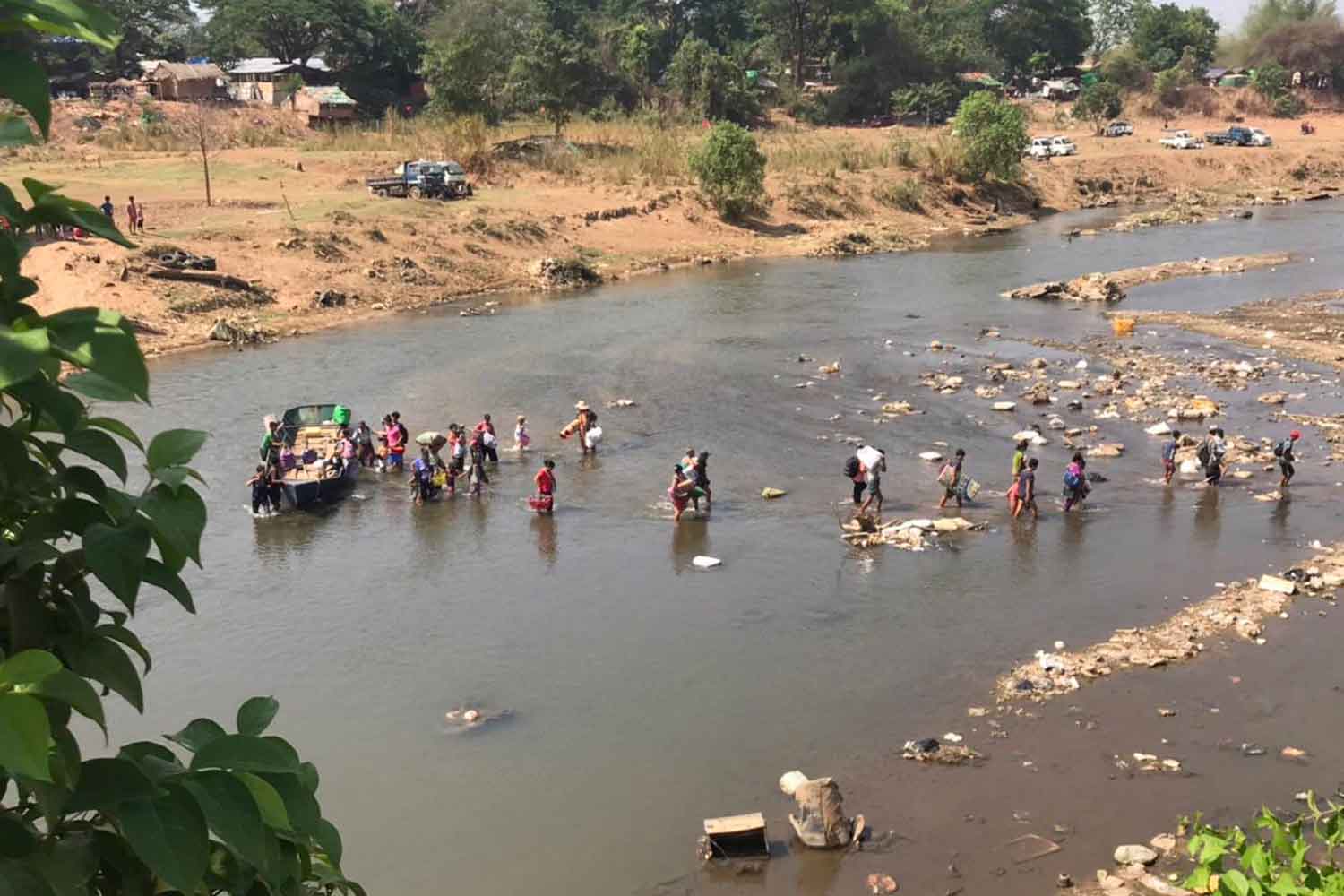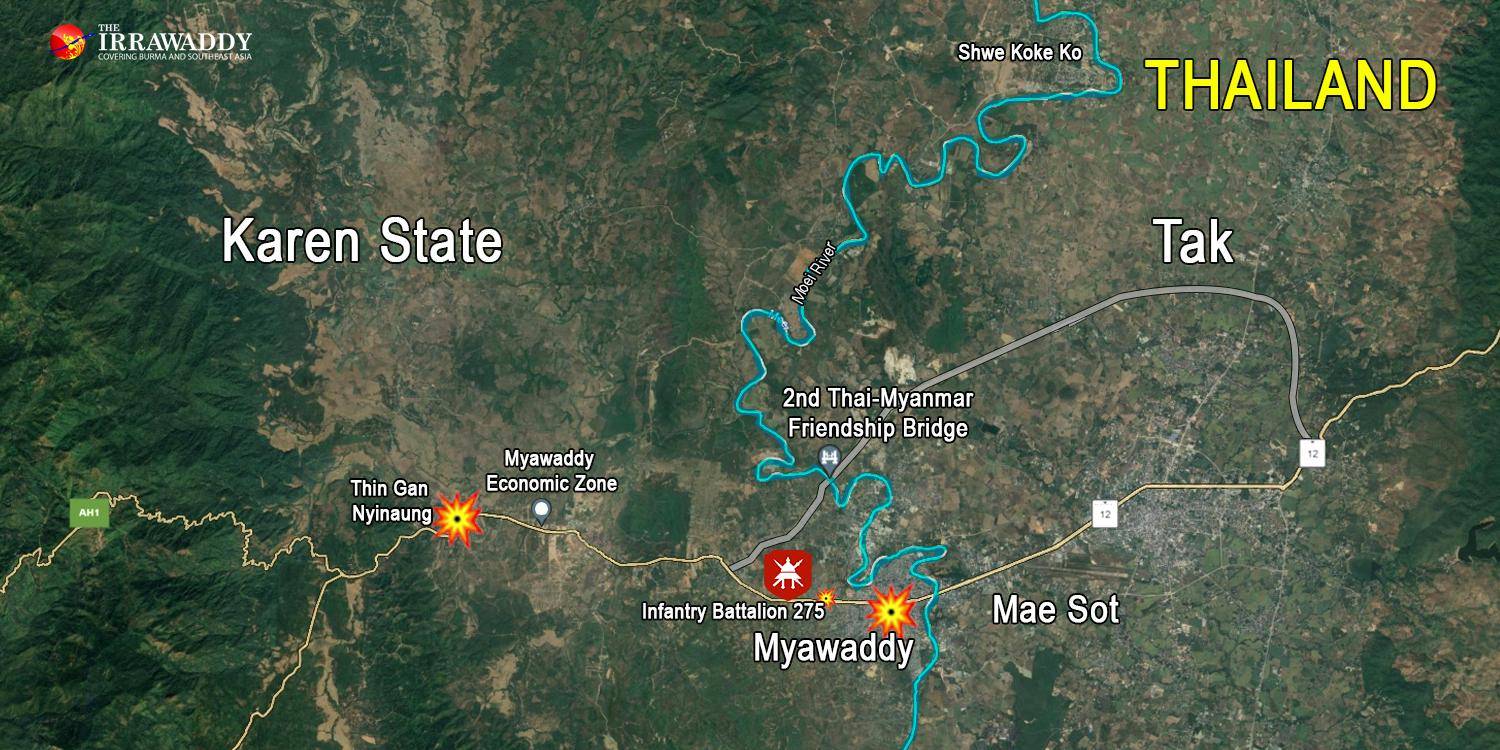Myanmar junta forces launched two airstrikes on Myawaddy town early Monday morning in a renewed attempt to retake the border trade hub from Karen rebels.
Residents said the attacks occurred at around 1 am but were not close to the Second Thai-Myanmar Friendship Bridge, the flashpoint of fighting between regime troops and the Karen National Liberation Army (KNLA) and allies on Friday and Saturday.
Casualty figures from Monday’s airstrike are as yet unknown, but at least seven civilians were killed and four wounded during fighting on Saturday, according to a local rescue team.
The KNLA and allies unleashed an onslaught against Infantry Battalion 275 headquarters in Myawaddy on April 10, forcing 150 junta troops led by the 44th Light Infantry Division commander to flee to a defensive position at the No. 2 Friendship Bridge.
KNLA-led forces attacked the troops on Friday night, triggering fierce fighting throughout Saturday that saw junta aircraft drop more than 130 bombs, according to residents and observers monitoring the fighting.

The bombing raids inflicted civilian casualties and property damage in the border town, residents said.
The two sides clashed again early Sunday morning when four junta warplanes dropped 12 bombs at around 4 am, according to the KNLA’s political wing, the Karen National Union.
The guns fell silent around 9 am as the KNLA and allies retreated from the bridge in response to the junta’s air attacks, said locals.
Thai news agencies reported that the commander of the 44th Light Infantry Division, Brigadier-General Soe Min Htet, was killed in Saturday’s fighting and his body was sent to Mae Sot Hospital. However, a Thai national who visited the hospital to confirm the reports told The Irrawaddy that Soe Min Htet’s body was not there, though other junta soldiers were receiving treatment at the hospital. KNLA sources also declined to confirm reports of Soe Min Htet’s death.
In the wake of the fighting, junta Defense Minister General Mya Tun Oo has summoned leaders of other ethnic Karen armed groups including the Karen Border Guard Force, the Democratic Karen Benevolent Army and the Karen National Liberation Army (Peace Council), according to KNU sources.
Mya Tun Oo is apparently covering for deputy junta chief Soe Win, who has not been seen in public since early April. Soe Win was reportedly injured in a resistance drone attack while visiting Southeastern Command headquarters in Mon State’s Mawlamyine to oversee military operations in Myawaddy.
The Democratic Karen Benevolent Army and the KNLA (Peace Council) are signatories to the Nationwide Ceasefire Agreement and have engaged in peace talks with the regime since the coup.
The Karen State Border Guard Force split from the Myanmar military in January. The Irrawaddy’s calls to its chief Colonel Saw Chit Thu and spokesman Major Naing Maung Zaw to ask about their meeting with Mya Tun Oo went unanswered.

Refugees and Thailand’s response
Nearly 3,000 people have fled across the Moei River into Thailand’s Mae Sot district since the fighting broke out in Myawaddy.
However, Lt Gen Prasan Saengsirirak, the commander of the Thai Third Army which oversees the area, told Thai PBS on Monday morning that the number of Myanmar refugees in Mae Sot fell from about 3,000 on Sunday to about 1,000 on Monday as the fighting around Myawaddy eased and negotiations began.
The commander said the two sides in the conflict were now in talks and many of the people who had fled Myawaddy were now returning home from Mae Sot.
The Third Army has been closely monitoring the situation along the border since fighting broke out in Myawaddy.
It protested after a stray bullet from Myanmar hit a house in Mae Sot on Saturday.
The Royal Thai Air Force (RTAF) also has sent two F-16 fighter jets to patrol the airspace above Tak’s Mae Sot district on the border between Thailand and Myanmar.
Thai Prime Minister Srettha Thavisin posted on Facebook that he did not want the battles to spill over the border and said he would visit Mae Sot on Tuesday to monitor events, including border trade, and offer moral support to locals and security officials.

















